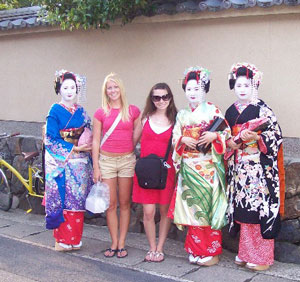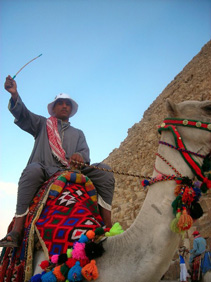|
Japan and Egypt:
Tweedle Dee and Tweedle Dum
Perry Jackman
Introduction
When asked to compare and
contrast Egypt
and Japan,
many would find more differences than similarities. I don’t blame
because when
I think of Japan I
think of sushi,
Buddhism, and geishas and when I think of Egypt I think of pharaohs,
pyramids
and Muslims. To a person who has been to neither country, one would
think that
these two countries would have nothing in common. They are on different
continents; they have different religions, and have different
cultures.
Fortunately for me, I have had a chance to visit both these countries.
Oddly
enough, I have found more similarities than differences.
Both countries have been affected by
globalization and are heavily influenced by the western world. Also
both
countries have a strong and well preserved history that has been
unaffected by
the outside world. To the naked eye Egypt
and Japan seem to
be
complete polar opposites, but if one takes a closer look, they will
find that Egypt and
Japan
are more parallel than they
thought.
Field Reports
Analysis
After
reading articles, “Supply-Side Sushi: Commodity, Market and the Global City”
and “Relocation and Creation of a Global
City” and visiting Japan and Egypt, I found that both
countries
are struggling with balancing their culture with globalization. When I
was
walking around in both cities, I felt that I was in a large westernized
city,
but when I looked across the street, I would find an ancient sight,
like the
pyramids or an ancient Buddhist temple. The cities of Egypt and Japan are developing and
getting
closer to Globalization. The closer they are to globalization, the
closer they
are to losing their culture. I hope that both countries find a way to
preserve
their history and culture and also find a way to be one of the global
powers in
the world.
I have also
found that both Egypt
and Japan
have kept their sense of culture even with the heavy influence of
globalization. When I was in Egypt,
I could hear the call of prayer echo through the streets of Cairo and see
veiled women walking down the
street. In Japan,
I saw women proudly wear the Geisha costumes and monks standing frozen
in the
streets asking for money. Their pride for their past and culture has
made Japan and Egypt
unlike any other country.
Globalization
has played a huge role as the cities of Egypt
and Japan
develop. Both countries have global businesses stationed in their huge
cities.
However, I believe the major cities in Japan
are more globilized than the major cities of Egypt.
Japan
has a stronger Economy and is
more developed. There technology is more advanced and do not have
poverty
problems like Egypt.
You can find examples of globalization in the cities of Egypt; however they need to solve their
poverty
problems before they can be one of the global powers like Japan.
If they
put an end of the housing problems in Cairo
and
work on the slums, Egypt
could catch up with Japan.
Their economy would increase, become more developed and modern.
Conclusion
Before going on this
voyage, I thought that Egypt
and Japan
couldn’t be more different and that they have nothing in common.
However, after
taking this course I was able to find numerous similarities between the
two
when I visited each country. The people
who haven’t seen the cities of Japan
and Egypt
first hand wouldn’t be able to see the similarities between the two
countries.
For example, they wouldn’t notice that both countries are incredibly
proud of
their past and of their culture. They also wouldn’t have noticed how
each
country is heavily influenced by globalization. Luckily for me, I have
had the
chance to see how both countries correlate.
|


